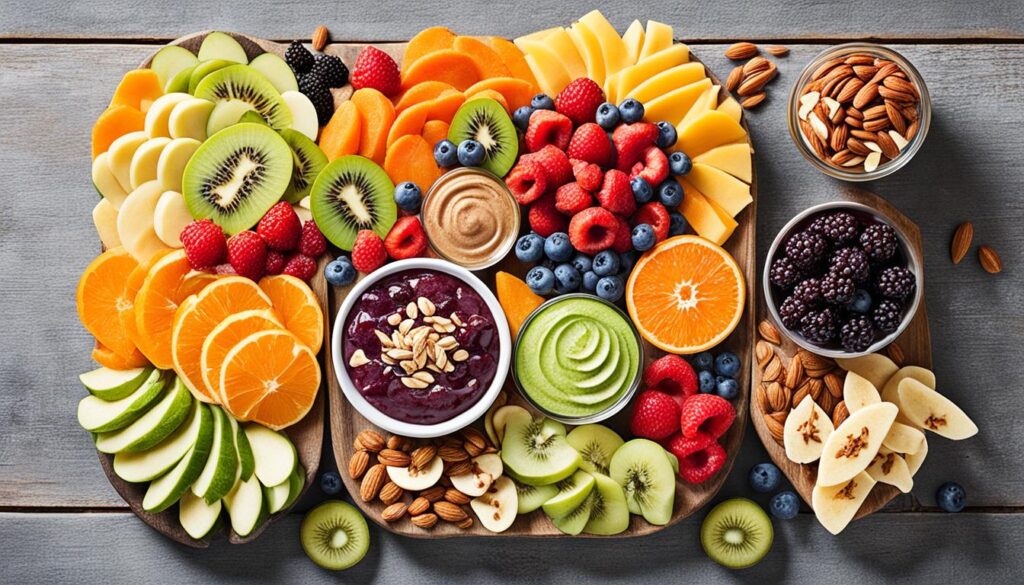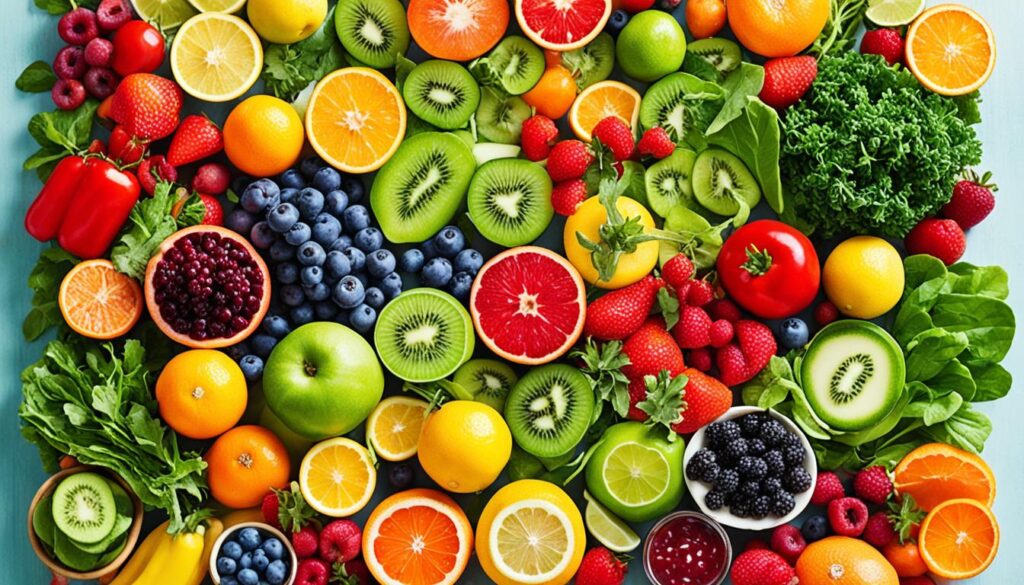Did you know that optimal nutrition can significantly impact your energy levels and overall vitality? It’s true! By adopting the right dietary strategies, you can fuel your body for optimal performance and sustain high energy levels throughout the day. In this article, I will share some key tips and techniques for achieving optimal nutrition for energy, helping you unleash your full potential.
Key Takeaways:
- Optimal nutrition plays a crucial role in boosting energy levels and promoting overall vitality.
- Eating regularly can help maintain consistent energy levels and prevent hunger.
- A balanced plate, including whole grains, lean protein, fruits and vegetables, provides sustained energy.
- Choose energy-boosting snacks that contain lean protein and dietary fiber.
- Avoid energy-zapping foods and beverages high in added sugars.
Eat Regularly to Maintain Energy Levels
Eating regularly is essential for maintaining consistent energy levels. Rather than relying on one or two large meals, aim to eat every three to four hours to prevent between-meal hunger. This approach helps to keep your blood sugar stable and provides a steady source of fuel for your body. Remember, having fuel in your system on a regular basis can improve focus and overall well-being.
When you go too long without eating, your body may enter a state of hunger, causing your blood sugar levels to drop. This can lead to low energy, difficulty concentrating, and general lethargy. By eating regularly, you can prevent hunger pangs and maintain a steady flow of nutrients to keep you energized throughout the day.
Avoiding prolonged periods of fasting also helps regulate your metabolism. When you eat regularly, your body doesn’t have to go into “starvation mode” and conserve energy, which can often result in weight gain. Instead, regular meals and snacks keep your metabolism active, allowing your body to efficiently process nutrients and burn calories.
Benefits of Eating Regularly:
- Prevents blood sugar imbalances
- Helps maintain focus and productivity
- Provides a steady source of energy
- Prevents overeating and promotes weight management
- Supports overall well-being and vitality
To stay on track with regular eating habits, it can be helpful to plan and prepare meals in advance. Pack healthy snacks to take to work or school and have a meal schedule in mind. Mindful eating can also contribute to maintaining regular meal times. Pay attention to hunger and fullness cues and eat slowly to fully enjoy and appreciate your meals.
| Meal Time | Suggested Foods |
|---|---|
| Breakfast | Whole grain toast with avocado and eggs |
| Morning Snack | Greek yogurt with berries |
| Lunch | Grilled chicken salad with mixed greens and vegetables |
| Afternoon Snack | Carrot sticks with hummus |
| Dinner | Salmon with quinoa and roasted vegetables |
| Evening Snack | Apple slices with almond butter |
Remember, consistency is key when it comes to maintaining a healthy eating routine. By eating regularly, you can fuel your body optimally and ensure sustained energy throughout the day.
Balance Your Plate for Sustained Energy
A balanced meal is essential for maintaining sustained energy levels throughout the day. By incorporating foods from multiple food groups, you can provide your body with the necessary nutrients to fuel your activities. A balanced plate should include:
- Whole Grains: Whole grains such as brown rice, quinoa, and whole wheat bread are rich in fiber and complex carbohydrates. They provide a steady release of energy, preventing sudden spikes and crashes in blood sugar levels.
- Lean Protein: Include lean protein sources like chicken, turkey, tofu, or beans in your meals. Protein helps to slow down the digestion process, providing a longer-lasting source of energy.
- Fruits and Vegetables: Incorporate a variety of fruits and vegetables into your plate. These foods are packed with vitamins, minerals, and antioxidants that support overall energy production and well-being.
- Fat-Free or Low-Fat Dairy: Opt for fat-free or low-fat dairy products such as milk, yogurt, or cheese. These sources of dairy provide protein, calcium, and B vitamins, which are essential for energy metabolism.
By combining these food groups in a well-balanced meal, you can ensure that your body receives a variety of nutrients necessary for sustained energy throughout the day.
Use Snacks to Bridge Between Meals
Snacks can be a valuable tool in maintaining energy levels between meals. When choosing snacks, opt for options that provide a boost of energy and sustain you until your next meal. Look for snacks that are high in lean protein and contain dietary fiber, as these nutrients can help promote lasting energy.
Here are some examples of energy-boosting snacks:
- An apple and a handful of unsalted nuts
- Carrots and string cheese
- Low-fat Greek yogurt with fresh berries
These snacks provide a combination of lean protein, carbohydrates, and dietary fiber, which can help keep your energy levels stable throughout the day. Remember, snacks are not meant to fill you up, but rather to provide a small fuel source between meals.

Avoid Energy-Zapping Foods and Beverages
Certain foods and beverages can zap your energy levels instead of boosting them. It’s crucial to avoid added sugars, as they can lead to energy crashes and leave you feeling drained. Instead, opt for healthier alternatives that will provide sustained energy throughout the day.
Avoid Added Sugars
Added sugars can have a detrimental effect on your energy levels and overall health. They provide temporary spikes in energy followed by crashes, leaving you feeling tired and sluggish. To maintain steady energy levels, it’s best to reduce or eliminate added sugars from your diet. Keep an eye out for ingredients like high fructose corn syrup, sucrose, and glucose syrup, as these are common sources of added sugars.
Instead of reaching for sugary snacks like candy or pastries, try incorporating naturally sweet options into your diet. Fruits like berries, bananas, and apples provide a natural source of sweetness along with essential vitamins and minerals.
Skip Sugary Drinks
Sugary drinks can quickly deplete your energy levels and contribute to weight gain. Beverages like soda, fruit juices, sugary coffee drinks, and energy drinks are loaded with added sugars and empty calories. They provide a quick burst of energy but lead to energy crashes and can negatively impact your overall health.
Instead of reaching for sugary drinks, choose water or unsweetened alternatives that can help quench your thirst and keep you hydrated. Unsweetened tea, flavored water without added sugars, and herbal infusions can be refreshing options. Don’t forget about the benefits of low-fat milk as a nutrient-rich choice for hydration.
Choose Water and Unsweetened Beverages
Water is essential for maintaining optimal energy levels and overall health. Staying hydrated is crucial for your body’s functioning, including energy production. Whether it’s through plain water, herbal tea, or infused water with fresh fruits and herbs, finding ways to incorporate more water into your daily routine is essential.
Unsweetened beverages like flavored water, unsweetened tea, and black coffee can also be refreshing options that won’t deplete your energy levels. They provide hydration without the harmful effects of added sugars.
| Sugary Foods and Beverages to Avoid | Healthier Alternatives |
|---|---|
| Soda | Water with lemon or lime |
| Fruit Juices | Fresh fruit or infused water |
| Sugary Coffee Drinks | Black coffee or unsweetened coffee alternatives |
| Energy Drinks | Herbal tea or natural energy-boosting foods |
| Candy and Pastries | Fruits and healthier sweet treats |
By making conscious choices to avoid added sugars and opt for water and unsweetened beverages, you can maintain steady energy levels and support your overall well-being.
Start Your Day Right with a Balanced Breakfast
Breakfast sets the tone for your energy levels throughout the day. It’s important to choose a protein-rich breakfast to help reduce cravings and make healthier food choices. By incorporating well-balanced meal options into your breakfast, you can fuel your body and set yourself up for increased energy levels throughout the day.
Some healthy options for a protein-rich breakfast include:
- Eggs: They are a great source of high-quality protein and contain essential vitamins and minerals.
- Oatmeal: It is a fiber-rich whole grain that provides sustained energy and helps keep you fuller for longer.
- Greek yogurt: It is packed with protein and probiotics, which promote gut health and contribute to overall well-being.
- Whole grains: Foods like whole grain bread, cereal, or muffins can provide complex carbohydrates and dietary fiber for lasting energy.
By starting your day with a protein-rich and well-balanced breakfast, you can satisfy your hunger, stabilize your blood sugar levels, and set yourself up for a productive day ahead.
| Benefits of a Protein-Rich Breakfast | Benefits of a Well-Balanced Meal |
|---|---|
| 1. Helps reduce cravings throughout the day | 1. Provides necessary nutrients for sustained energy |
| 2. Promotes feelings of fullness and satiety | 2. Supports stable blood sugar levels |
| 3. Boosts metabolism and aids in weight management | 3. Enhances focus and cognitive function |
| 4. Supports muscle growth and repair | 4. Helps maintain a balanced diet throughout the day |
Incorporate Complex Carbohydrates and Protein
When it comes to sustaining energy levels, incorporating complex carbohydrates and protein into your diet is key. Unlike refined carbohydrates that can cause energy spikes and crashes, complex carbohydrates provide a steady release of energy, keeping you fueled throughout the day.
Complex carbohydrates are found in foods such as whole grains, brown rice, quinoa, beans, and starchy vegetables. By including these foods in your meals, you can stabilize your blood sugar levels and promote long-lasting energy.
But that’s not all – don’t forget to include protein sources as well. Protein plays a vital role in providing sustained energy and keeping you feeling fuller for longer. It also helps in repairing and building tissues in the body.
Protein-rich foods such as meat, fish, poultry, dairy products, beans, and nuts are excellent sources of energy-boosting protein. By incorporating these foods into your meals, you can enhance your energy levels and experience greater vitality throughout the day.
Here’s a simple table highlighting some examples of complex carbohydrates and protein sources:
| Complex Carbohydrates | Protein Sources |
|---|---|
| Whole grains (e.g., oats, whole wheat bread) | Chicken breast |
| Brown rice | Salmon |
| Quinoa | Greek yogurt |
| Beans (e.g., black beans, lentils) | Almonds |
| Starchy vegetables (e.g., sweet potatoes, corn) | Chickpeas |
By including complex carbohydrates and protein in your meals, you can stabilize your blood sugar levels, promote sustained energy, and experience increased vitality throughout the day.
Stay Hydrated and Get Essential Nutrients
Proper hydration is crucial for maintaining energy levels. By drinking enough water, you can support your body’s functions and promote overall well-being. Aim to drink at least 6 to 8 cups of water daily, and increase your intake if you exercise or live in a hot climate. Hydration doesn’t have to come from water alone; high-water content foods such as cucumbers, watermelon, strawberries, and celery can also contribute to your fluid intake.
In addition to staying hydrated, it’s important to ensure you’re getting essential nutrients that play a role in energy production. Incorporate foods rich in iron, such as beans, lentils, spinach, and sesame seeds, into your diet. Iron helps transport oxygen throughout the body, supporting energy metabolism. Also, include foods high in vitamin B12 like fruits, vegetables, whole grains, meat, and fish. Vitamin B12 helps with the production of red blood cells, which carry oxygen to tissues.
By staying hydrated and nourishing your body with essential nutrients, you can optimize your energy levels and promote overall well-being. Remember to drink enough water throughout the day and incorporate high-water content foods into your meals. Additionally, prioritize foods rich in iron and vitamin B12 to support energy production. Taking these steps can contribute to sustained energy levels and improved vitality.

